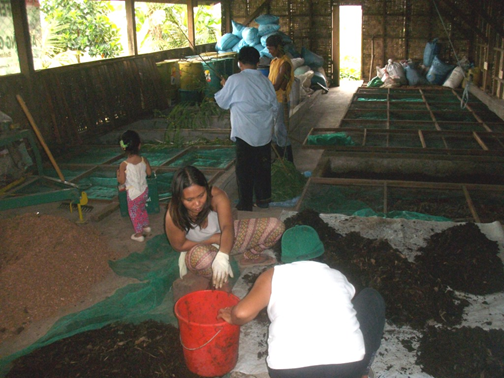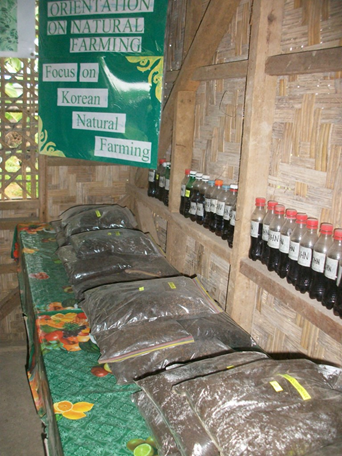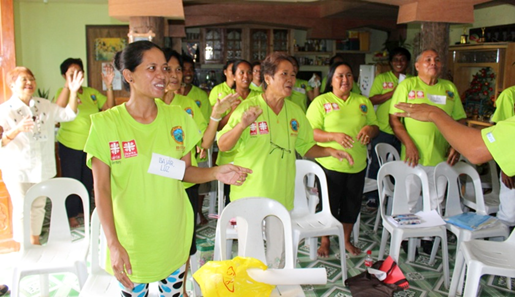In the village of Balangiga, in the South of Eastern Samar, live 12,756 inhabitants. At least 90% of these people’s livelihood comes from growing bananas, rice, various root crops, vegetables and coconuts. Their lives, sadly, changed radically when the village was hit by typhoon in November 2013. After two years, the people of Balangiga have gradually begun to stand on their own two feet again.
 The 2013 typhoon destroyed agricultural machinery, tools and seeds, killed livestock and essentially took all of the property of the local population. After providing immediate humanitarian assistance, Caritas Czech Republic, in cooperation with the Association of Amazing Grace, has been dedicated to restoring affected areas and by supporting local farmers, both men and women. For example in 2015, a new building was erected in which one wing is used to store earthworms that produce vermicompost, i.e. manure obtained by the decomposition of organic material using only the help of earthworms. The second wing of the building is used for training, workshops and the actual production of fertilizers. A smaller building was added later, which is used as an office, warehouse, kitchen, and accommodation for an on-duty security officer.
The 2013 typhoon destroyed agricultural machinery, tools and seeds, killed livestock and essentially took all of the property of the local population. After providing immediate humanitarian assistance, Caritas Czech Republic, in cooperation with the Association of Amazing Grace, has been dedicated to restoring affected areas and by supporting local farmers, both men and women. For example in 2015, a new building was erected in which one wing is used to store earthworms that produce vermicompost, i.e. manure obtained by the decomposition of organic material using only the help of earthworms. The second wing of the building is used for training, workshops and the actual production of fertilizers. A smaller building was added later, which is used as an office, warehouse, kitchen, and accommodation for an on-duty security officer.
Thanks to the creation of this agricultural base, which has hosted many training sessions from October 2014 onwards, the local growers are now able to produce their own organic manure. Before the actual production and cultivation of bio crops, the soil must be prepared, and irrigation canals, gutters, flowerbeds and paths between fields must be created. Certain equipment is also required. For example, a crusher from Manila was bought to the area in November 2014. The transport of the crusher to Balangiga was supported by Caritas Germany.
 In May 2015, the Caritas Czech Republic employees began teaching locals the principles of organic cultivation and the production of natural fertilizer with the help of earthworms. A total of 938 farmers took part in the two-day training on the cycle of nutrients, soil fertilization using vermicompost, and the importance of organic farming. Snacks and beverages were provided for the duration of the training and all travel fees to the venue were included. At the end of the program, the farmers were given manuals and certificates confirming completion of the course.
In May 2015, the Caritas Czech Republic employees began teaching locals the principles of organic cultivation and the production of natural fertilizer with the help of earthworms. A total of 938 farmers took part in the two-day training on the cycle of nutrients, soil fertilization using vermicompost, and the importance of organic farming. Snacks and beverages were provided for the duration of the training and all travel fees to the venue were included. At the end of the program, the farmers were given manuals and certificates confirming completion of the course.
Within the same month, employees of Caritas Czech Republic began the local earthworm manure production program. Although the total weight of the earthworms from the overall area was only 5 kg, the production of vermicompost has nonetheless gotten off to a successful start.
Training fields ensuring the efficiency of the method were launched during the same summer. The electricity and watering facilities were set up. Participants of the training bought and were given the first organically grown crops (e.g. vegetables, spices or eggs). They also bought a few farm animals (4 goats, 17 ducks, 2 wild boars and 10 chickens). In September, they had managed  to produce 1,500 kg of vermicompost and 300 L of liquid fertilization.
to produce 1,500 kg of vermicompost and 300 L of liquid fertilization.
The main customers are still the members of the Association, because the produced materials cannot meet the external demand. The production is however growing bigger and the name of the association is becoming more popular in the region, not only thanks to Caritas Czech Republic. Caritas Czech Republic wishes Balangiga and its citizens success, even after it ends its activities in this part of the Philippines!







